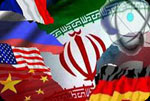 AFP: President Hassan Rowhani demanded Sunday that Western governments recognise Iran’s right to enrich uranium in any nuclear deal, ahead of his departure for key talks at the United Nations.
AFP: President Hassan Rowhani demanded Sunday that Western governments recognise Iran’s right to enrich uranium in any nuclear deal, ahead of his departure for key talks at the United Nations.
By Cyril Julien
 TEHRAN (AFP) — President Hassan Rowhani demanded Sunday that Western governments recognise Iran’s right to enrich uranium in any nuclear deal, ahead of his departure for key talks at the United Nations.
TEHRAN (AFP) — President Hassan Rowhani demanded Sunday that Western governments recognise Iran’s right to enrich uranium in any nuclear deal, ahead of his departure for key talks at the United Nations.
Rowhani, a moderate on Iran’s political scene whose election in June had raised Western hopes of a breakthrough in long-stumbling nuclear talks, said a deal to allay Western suspicions was dependent on acceptance of Iran’s enrichment programme.
“If they accept these rights, the Iranian people are a rational people, peaceful and friendly. We stand ready to cooperate and together we can settle all the region’s problems and even global ones,” Rowhani said.
His comments, at an annual military parade, came on the eve of his departure for the UN General Assembly in New York where he is scheduled to deliver a keynote address and meet French President Francois Hollande on the sidelines.
Foreign Minister Mohammad Javad Zarif is already in New York for talks with his British and French counterparts, and with European Union foreign policy chief Catherine Ashton, who represents the major powers in the nuclear talks.
Rowhani has said he wants those talks to resume as quickly as possible but insisted on Sunday that they do so “without precondition.”
The UN Security Council has imposed four rounds of sanctions on Iran for failing to heed six successive ultimatums to suspend uranium enrichment, which Western governments suspect conceals a covert drive for a weapons capability.
When Rowhani served as chief nuclear negotiator under reformist president Mohammad Khatami in the early 2000s, Iran agreed to a suspension of the sensitive process, which in highly extended form can produce the core of a nuclear warhead.
But the UN nuclear watchdog said at the end of August that Iran is continuing to expand its uranium enrichment programme under Rowhani’s presidency.
Rowhani has made several diplomatic overtures since his election in June, and there has been speculation that he could also meet US President Barack Obama on the sidelines of the General Assembly, which opens on Tuesday.
But Washington warned on Friday that while welcome, the overtures were not enough for it to consider loosening crippling sanctions on Iran’s oil and banking sectors that Rowhani has said he wants eased.
White House national security spokesman Ben Rhodes said Washington was waiting for more concrete evidence that Iran was ready to make concessions.
“We’ve always made clear that we’ll make judgements based on the actions of the Iranian government not just on their words,” he said.
Rhodes said the United States had made it clear “that we do have a preference for resolving this issue diplomatically,” but warned: “We want to make clear that there’s not an open-ended window for diplomacy.”
Rowhani hit back at those comments Sunday, warning Washington that it could “not use the language of war and diplomacy at the same time.”
If there were any attack by Washington or its ally Israel, Iran would riposte “with determinedly until victory,” he warned.
Underlining his comments at an annual military parade, Iran displayed the largest number yet of two missiles it has developed that are theoretically capable of striking targets in Israel or US bases in the Gulf.
Iran paraded 12 Sejil and 18 Ghadr missiles, both with a nominal range of 2,000 kilometres (1,250 miles).
Rowhani’s comments also came on the eve of the official handover by its Russian constructors of Iran’s first nuclear power plant at Bushehr on the Gulf coast.
Iranian Atomic Energy Agency chief Ali Akbar Salehi said he expected work to start soon on a second nuclear power plant on completion of talks with Moscow.
“Negotiations are continuing and are well-advanced,” he said. “Work will start soon,” he added, without giving a date.
Gulf Arab states have expressed concern about the plant but Iran and Russia say it is subject to International Atomic Energy Agency safeguards.


